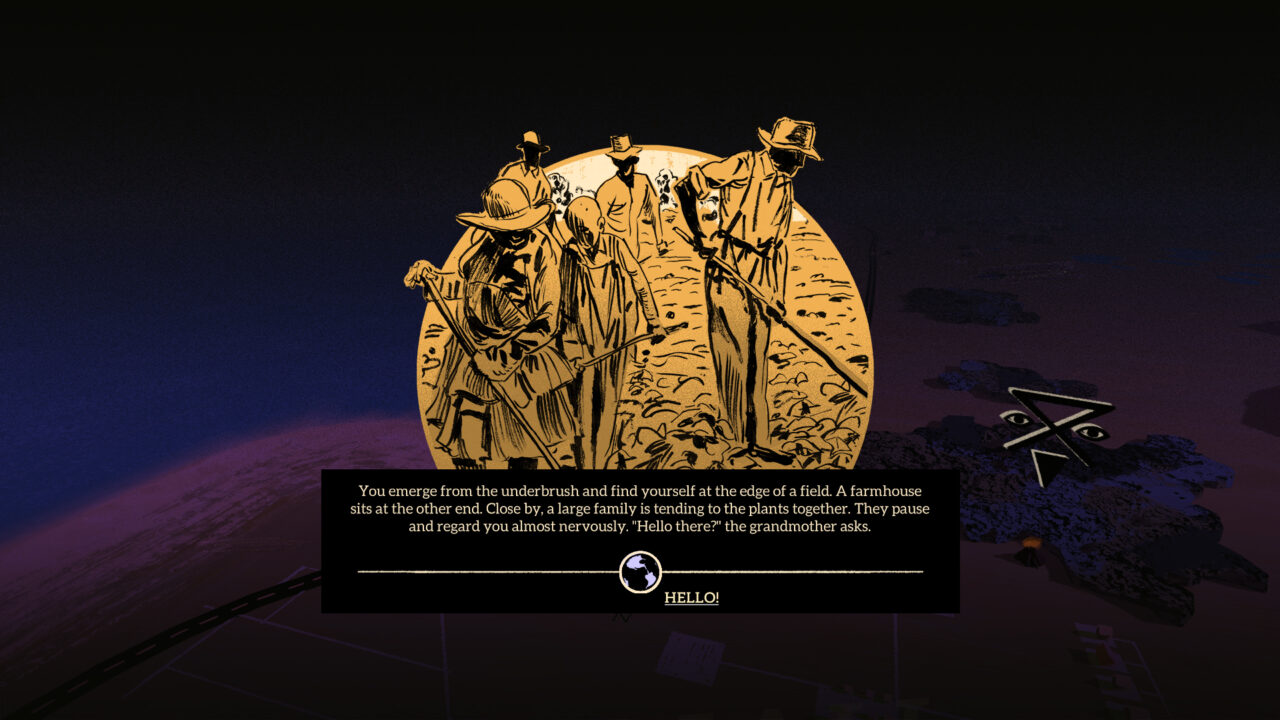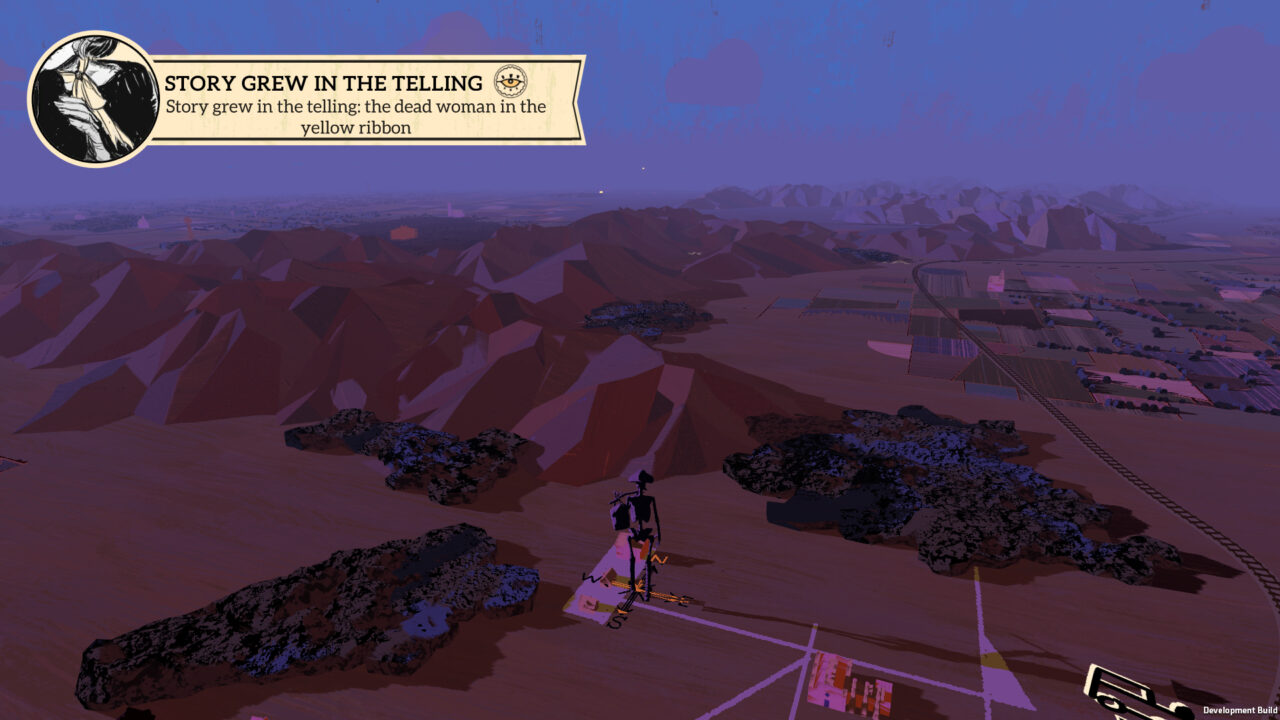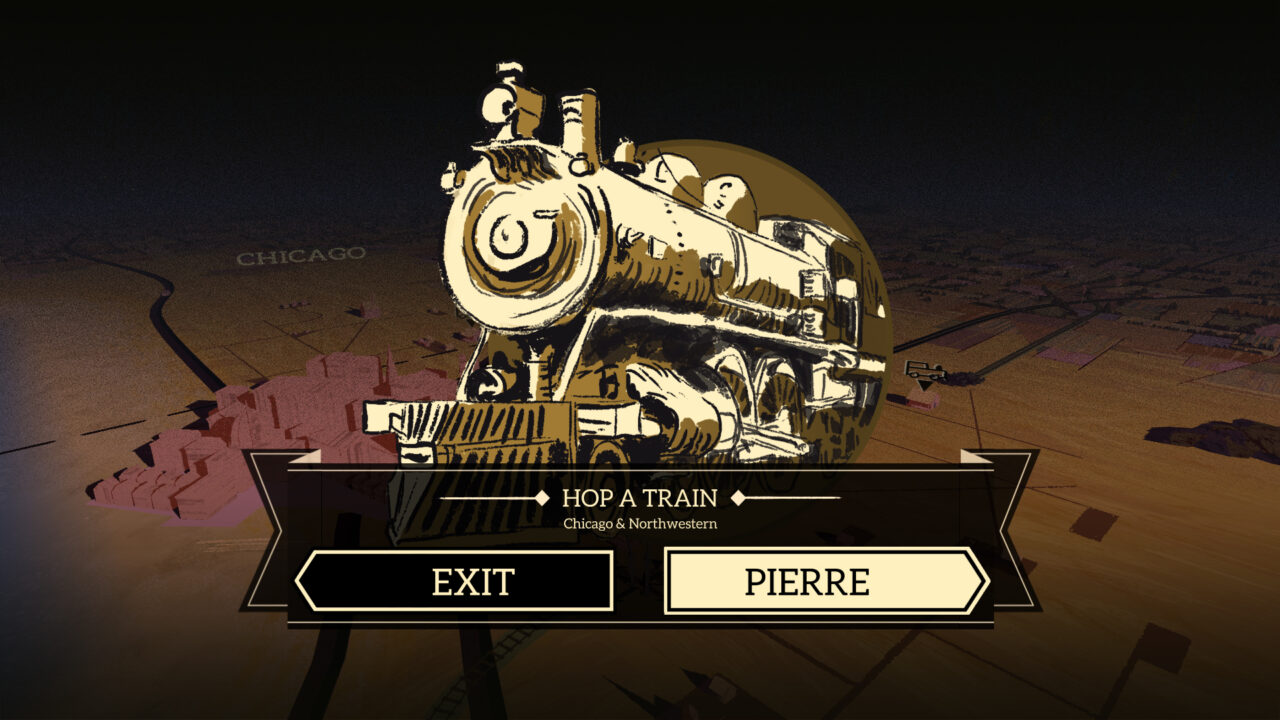Where the Water Tastes Like Wine Review- Woody Guthrie Enters the Zone

Developed by Dim Bulb Games, Serenity Forge, DO Games
Published by Good Shepherd Entertainment
Available on PS4, Xbox One, PC, Mac, Linux, and Nintendo Switch
MSRP $19.99
When I was told I would be reviewing a “Great Depression hobo simulator,” I was thrilled. The Great Depression and Dust Bowl are some of the most fascinating years of American history. It was a seemingly apocalyptic time—dust storms covering entire states, ecological devastation, mass unemployment, and mass displacement. But disaster is also a time where people come together, differences are put aside in service of a common goal, and suddenly a population becomes a community. This is the setting of Where the Water Tastes Like Wine; an era where the poor and destitute grappled with the wrath of God. Also the narration is done by Sting.
Where the Water Tastes Like Wine begins with you the character in a shack playing a game of cards. Of course, you the player are not playing cards, just going through the predetermined dialogue options. But your character is winning big, and the other players begin to drop out until all that is left is just you and a man with a suspiciously large head which has been hidden in shadow. For the final round you both go all in; how can this man with a head the size of a bankruptcy barrel possibly win against your royal flush? Ahh but in a terrible twist of fate, it turns out that the shadow man has the flush and you are merely holding some Loteria cards. A classic ruse. He leans forward and reveals that he’s got a massive wolf head and that you are his servant, and instructs you to go across the land and find and spread as many stories as possible. And off you go.

The stories are the main aspect of Where the Water Tastes Like Wine, so much so that the word almost loses meaning. But the writing is the best part of the game. The dozens of brief stories you encounter range from the banal to the bizarre. These stories can take the form of anything from being face to face with the Jersey Devil, or some fellas having a picnic at the quarry. You may awaken from a nap, only to briefly find yourself in the middle of a ghostly raging civil war battle. Or you may see a husband and wife break up over food. You may see and behold an ashen horse and its rider’s name was Death. Or you can encounter a man who complains about the quality of wine at the cafe. There is an element of Where the Water Tastes Like Wine that teeters on the edge of reality, leaving you unsure if your character has transcended time and space or, more likely, merely has a bad case of the French Pox.
Where the Water Tastes Like Wine has gameplay in the loosest sense of the term. There is an overworld, the entire continental United States, in which you (very slowly) travel. Walking across a continent is not quick. You can speed up walking by whistling, get lucky hitchhiking, or you can risk a beating by sneaking onto a train. It should be noted that in this overworld your character appears to be, or travels inside of, a 1000 foot tall skeleton with a modest sombrero and bindle. As you traverse the countryside in your calaca styled EVA Unit, really you are just on the lookout for the little white icons indicating various encounters. There are a few types of encounters that generally fall into three categories.

The first is you experience a story firsthand, a brief event or interaction with the world. This kind of encounter is the bulk of Where the Water Tastes Like Wine. The next is when you are told a story. More often than not, you are told a story of which you have already experienced, but being retold so many times they are now wildly different. Like a game of telephone, the stories you spread take on a life of their own. These first two can be found on their own in the wild or in places like cities, but ultimately they all function the same. These have some light RPG elements, where the stakes are extremely low. If, for example, some guy offers you a job working on a dangerous bridge while untethered, why would you ever not do that? You’re out here to get those delicious tasty stories and you better be ready to risk basically nothing to get them.
The final form of interaction in Where the Water Tastes Like Wine is the campfire. There are 20 (I think) important characters out in the world who you will encounter on their travels. You spend the night with them by the campfire, sharing stories. Well, you give them stories and they give you vague platitudes about the spirit of the country or the secrets of the ground or some shit. I don’t know. I was busy focusing on the little bar on top of the screen that indicated whether or not they were interested in what I had to say. Every one of these characters will ask you, probably five times in a night, to tell them a story. Tell me a sad story, tell me a happy story, you get the idea. You then get to select one of the stories you’ve encountered from a massive wheel of tarot cards, I would assume representing the story but in practice seems arbitrary.

The difficult part is that a lot of these stories or requests don’t seem to have a straightforward enough theme to appease these campfire assholes. A coal miner asked for a story about bravery. I told him about the jovial guys on the bridge without tethers. And he said I had a bad sense of humor. He then asked for a tragic story, and I told him of a husband and wife separated by poverty. And again, that grimey son of a bitch said I had a bad sense of humor. I don’t really know how to go about fixing this, or even if it’s worth fixing. Because there’s nothing you lose by not impressing these campfire people. It’s just some light gameplay interaction to expand upon the greater platform of Where the Water Tastes Like Wine, which is ultimately to tell these stories.
The aesthetic is enough to make Where the Water Tastes Like Wine worth playing. At first glance, there doesn’t seem to be much; The overworld is mostly a flat plain, give or take a few mountain ranges or rivers, and for the most part, the graphics here are not great. The textures are flat, the render distance is short (though if to scale it would actually be like 50 miles, so in a way, it’s the longest of any game), and your down-and-out Gashadokuro is only seen from behind, masking its details.

But the longer you play, the more you realize just what a masterful piece of art Where the Water Tastes Like Wine is. The skybox is a painting of fantastical colors that change throughout the day, and dozens of original folk songs on the soundtrack have lyrics that accompany whatever region you’re traveling in. Where the style really shines is the artwork you see during encounters. Each of the basic encounters has a hand-drawn picture of the scenario and the people you meet at the campfire’s get an especially well-drawn and colorful piece. The developers were wise to place style and narration above gameplay and graphics. This is one of the few games that masterfully creates an atmosphere.
Where the Water Tastes Like Wine whips ass. Not really a game so much as a medium of displaying a sprawling work of art that attempts, and mostly succeeds, in capturing the zeitgeist of a forgotten era. The first work of Dim Bulb Games is certainly ambitious, but as a whole, they created a fantastic experience. Obviously this isn’t for everyone. The gameplay is minimal, and it’s often pretty slow. But as a narrative game, it is unique both in style and setting and in a way is in a genre of its own.
-
Game
Summary
Not much gameplay but enough story and art to make up for it times ten. Also its narrated by Sting.
Categorized: Reviews
